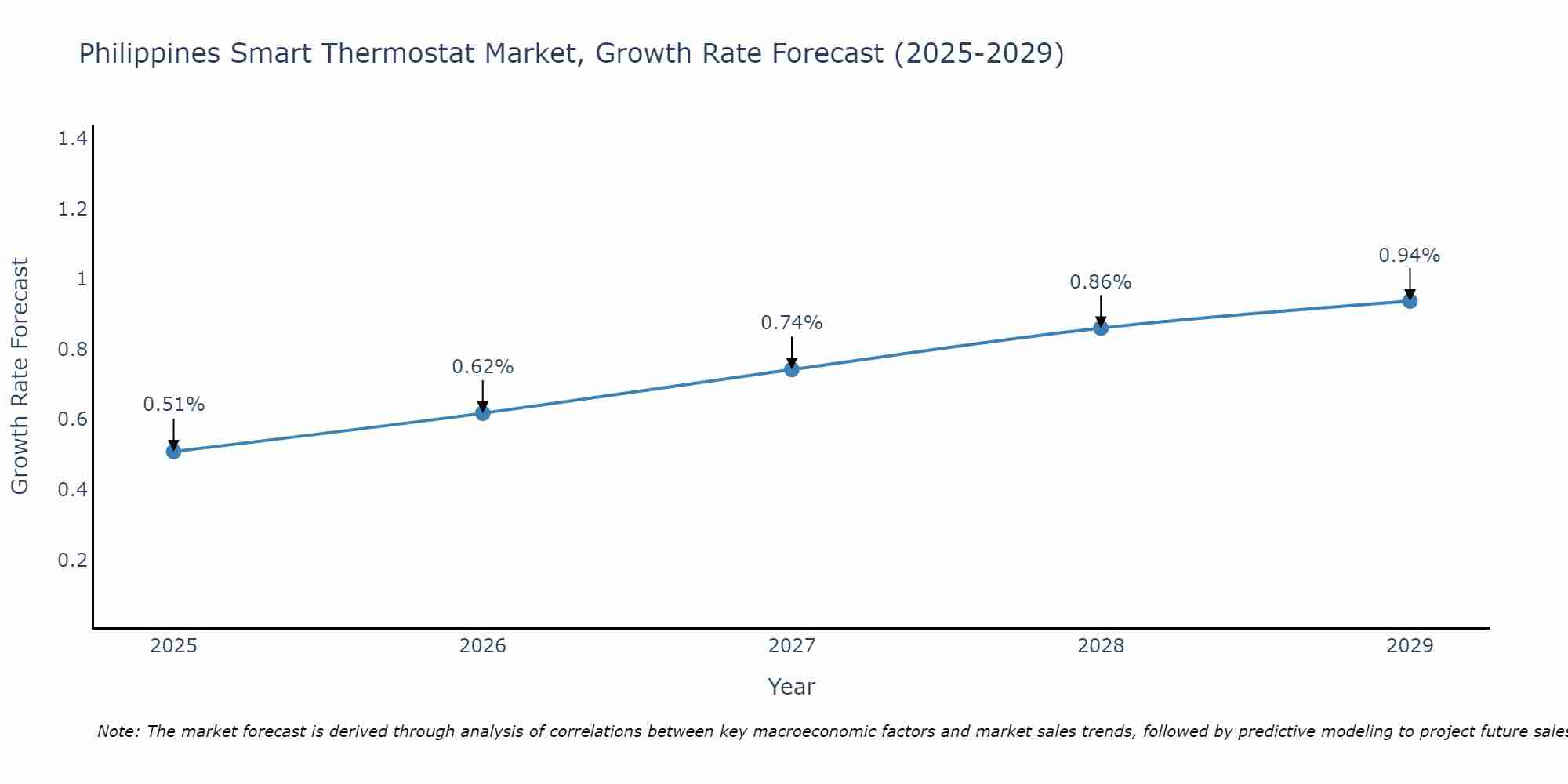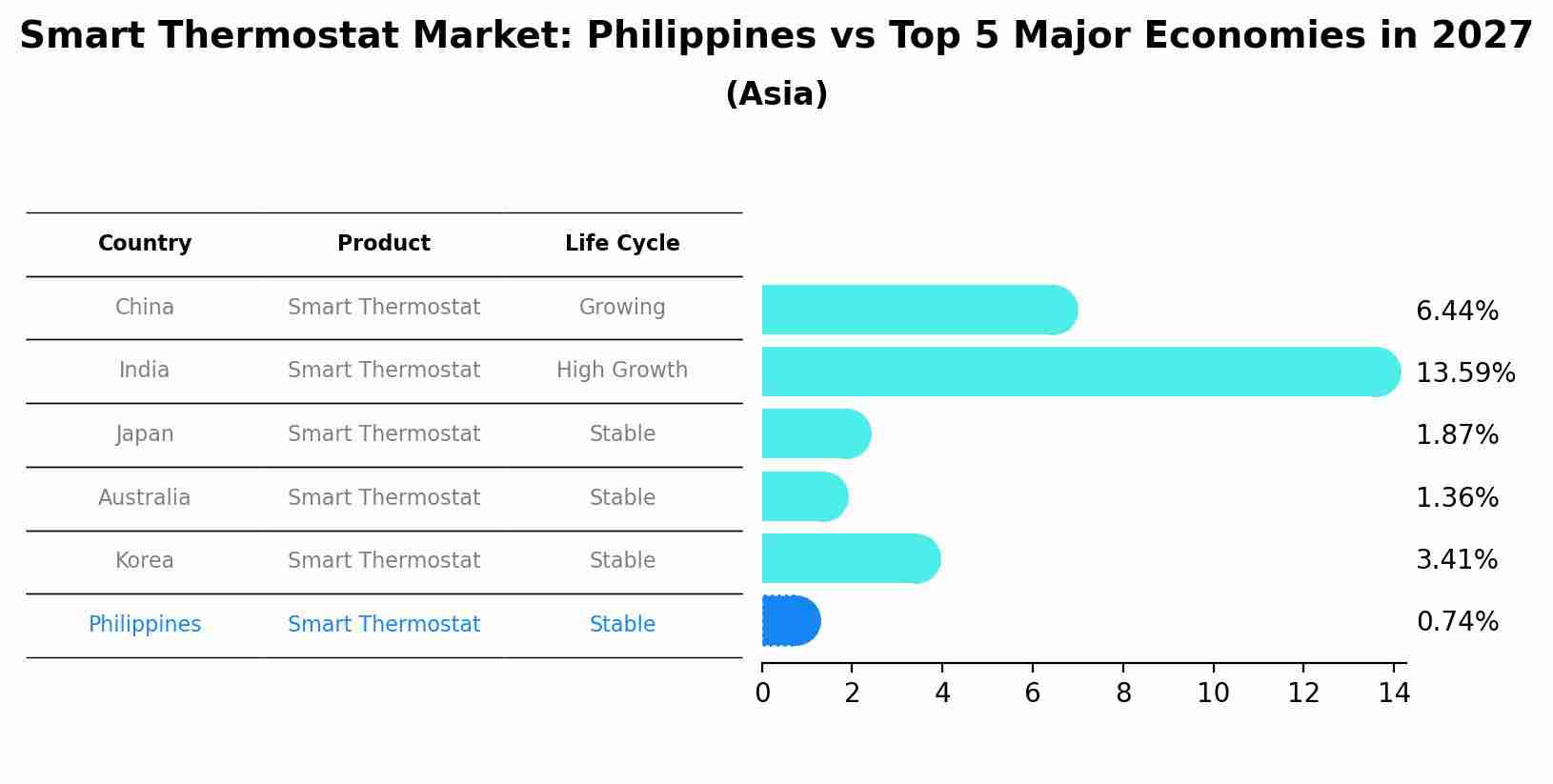Philippines Smart Thermostat Market (2025-2031) Outlook | Industry, Value, Companies, Revenue, Share, Analysis, Forecast, Growth, Trends & Size
| Product Code: ETC369509 | Publication Date: Aug 2022 | Updated Date: Apr 2025 | Product Type: Market Research Report | |
| Publisher: 6Wresearch | Author: Ravi Bhandari | No. of Pages: 75 | No. of Figures: 35 | No. of Tables: 20 |
Philippines Smart Thermostat Market Size Growth Rate
The Philippines Smart Thermostat Market is poised for steady growth rate improvements from 2025 to 2029. The growth rate starts at 0.51% in 2025 and reaches 0.94% by 2029.

Smart Thermostat Market: Philippines vs Top 5 Major Economies in 2027 (Asia)
The Smart Thermostat market in Philippines is projected to grow at a stable growth rate of 0.74% by 2027, highlighting the country's increasing focus on advanced technologies within the Asia region, where China holds the dominant position, followed closely by India, Japan, Australia and South Korea, shaping overall regional demand.

philippines smart thermostat market Synopsis
In the segment of smart thermostats, the Philippines market is expected to witness steady adoption. With growing awareness of energy conservation and home automation, smart thermostats are gaining popularity for their ability to optimize heating and cooling systems. The market for smart thermostats is projected to grow at a CAGR of approximately 6. 3% as more households embrace smart home technologies.
Drivers of the Market
The Philippines` smart thermostat market is expected to experience moderate growth in the coming years. The increasing adoption of smart home technologies, coupled with a growing awareness of energy efficiency, is driving the demand for smart thermostats. These devices offer users the ability to remotely control and schedule their heating, ventilation, and air conditioning (HVAC) systems, leading to energy savings and enhanced comfort. As urbanization and disposable incomes rise in the Philippines, the market for smart home solutions, including smart thermostats, is likely to expand.
Challenges of the Market
The Philippines smart thermostat market is poised for growth, but it faces several challenges. One major hurdle is the relatively low awareness and adoption of smart home technologies in the country. While there is increasing interest in energy-efficient solutions, the upfront cost of smart thermostats can deter price-sensitive consumers. Additionally, issues related to internet connectivity and infrastructure can hinder the seamless functioning of these devices. The market also contends with the challenge of educating consumers about the long-term cost savings associated with smart thermostats, as well as their environmental benefits. Moreover, regulatory hurdles and concerns about data privacy and security can impede the widespread adoption of these technologies.
COVID-19 Impact on the Market
The market might face challenges in terms of affordability for a significant portion of the population. The COVID-19 pandemic initially impacted supply chains and consumer spending but also highlighted the importance of indoor comfort control.
Key Players in the Market
Key Players operating in the market are Google (Nest), ecobee, Honeywell, Tado, Sensi, and Schneider Electric.
Key Highlights of the Report:
- Philippines Smart Thermostat Market Outlook
- Market Size of Philippines Smart Thermostat Market, 2024
- Forecast of Philippines Smart Thermostat Market, 2031
- Historical Data and Forecast of Philippines Smart Thermostat Revenues & Volume for the Period 2021-2031
- Philippines Smart Thermostat Market Trend Evolution
- Philippines Smart Thermostat Market Drivers and Challenges
- Philippines Smart Thermostat Price Trends
- Philippines Smart Thermostat Porter's Five Forces
- Philippines Smart Thermostat Industry Life Cycle
- Historical Data and Forecast of Philippines Smart Thermostat Market Revenues & Volume By Type for the Period 2021-2031
- Historical Data and Forecast of Philippines Smart Thermostat Market Revenues & Volume By Wireless for the Period 2021-2031
- Historical Data and Forecast of Philippines Smart Thermostat Market Revenues & Volume By Wireless for the Period 2021-2031
- Historical Data and Forecast of Philippines Smart Thermostat Market Revenues & Volume By End-User Vertical for the Period 2021-2031
- Historical Data and Forecast of Philippines Smart Thermostat Market Revenues & Volume By Residential for the Period 2021-2031
- Historical Data and Forecast of Philippines Smart Thermostat Market Revenues & Volume By Commercial for the Period 2021-2031
- Philippines Smart Thermostat Import Export Trade Statistics
- Market Opportunity Assessment By Type
- Market Opportunity Assessment By End-User Vertical
- Philippines Smart Thermostat Top Companies Market Share
- Philippines Smart Thermostat Competitive Benchmarking By Technical and Operational Parameters
- Philippines Smart Thermostat Company Profiles
- Philippines Smart Thermostat Key Strategic Recommendations
Frequently Asked Questions About the Market Study (FAQs):
- Single User License$ 1,995
- Department License$ 2,400
- Site License$ 3,120
- Global License$ 3,795
Search
Thought Leadership and Analyst Meet
Our Clients
Related Reports
- Canada Oil and Gas Market (2026-2032) | Share, Segmentation, Value, Industry, Trends, Forecast, Analysis, Size & Revenue, Growth, Competitive Landscape, Outlook, Companies
- Germany Breakfast Food Market (2026-2032) | Industry, Share, Growth, Size, Companies, Value, Analysis, Revenue, Trends, Forecast & Outlook
- Australia Briquette Market (2025-2031) | Growth, Size, Revenue, Forecast, Analysis, Trends, Value, Share, Industry & Companies
- Vietnam System Integrator Market (2025-2031) | Size, Companies, Analysis, Industry, Value, Forecast, Growth, Trends, Revenue & Share
- ASEAN and Thailand Brain Health Supplements Market (2025-2031) | Strategy, Consumer Insights, Analysis, Investment Trends, Opportunities, Growth, Size, Share, Industry, Revenue, Segments, Value, Segmentation, Supply, Forecast, Restraints, Outlook, Competition, Drivers, Trends, Demand, Pricing Analysis, Competitive, Strategic Insights, Companies, Challenges
- ASEAN Bearings Market (2025-2031) | Strategy, Consumer Insights, Analysis, Investment Trends, Opportunities, Growth, Size, Share, Industry, Revenue, Segments, Value, Segmentation, Supply, Forecast, Restraints, Outlook, Competition, Drivers, Trends, Demand, Pricing Analysis, Competitive, Strategic Insights, Companies, Challenges
- Europe Flooring Market (2025-2031) | Outlook, Share, Industry, Trends, Forecast, Companies, Revenue, Size, Analysis, Growth & Value
- Saudi Arabia Manlift Market (2025-2031) | Outlook, Size, Growth, Trends, Companies, Industry, Revenue, Value, Share, Forecast & Analysis
- Uganda Excavator, Crane, and Wheel Loaders Market (2025-2031) | Strategy, Consumer Insights, Analysis, Investment Trends, Opportunities, Growth, Size, Share, Industry, Revenue, Segments, Value, Segmentation, Supply, Forecast, Restraints, Outlook, Competition, Drivers, Trends, Demand, Pricing Analysis, Competitive, Strategic Insights, Companies, Challenges
- Rwanda Excavator, Crane, and Wheel Loaders Market (2025-2031) | Strategy, Consumer Insights, Analysis, Investment Trends, Opportunities, Growth, Size, Share, Industry, Revenue, Segments, Value, Segmentation, Supply, Forecast, Restraints, Outlook, Competition, Drivers, Trends, Demand, Pricing Analysis, Competitive, Strategic Insights, Companies, Challenges
Industry Events and Analyst Meet
Whitepaper
- Middle East & Africa Commercial Security Market Click here to view more.
- Middle East & Africa Fire Safety Systems & Equipment Market Click here to view more.
- GCC Drone Market Click here to view more.
- Middle East Lighting Fixture Market Click here to view more.
- GCC Physical & Perimeter Security Market Click here to view more.
6WResearch In News
- Doha a strategic location for EV manufacturing hub: IPA Qatar
- Demand for luxury TVs surging in the GCC, says Samsung
- Empowering Growth: The Thriving Journey of Bangladesh’s Cable Industry
- Demand for luxury TVs surging in the GCC, says Samsung
- Video call with a traditional healer? Once unthinkable, it’s now common in South Africa
- Intelligent Buildings To Smooth GCC’s Path To Net Zero


















